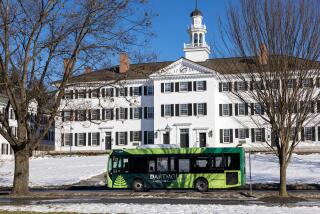Blind UCLA graduate can use computer-assisted reading tools during state bar exam
A federal judge has ordered the National Conference of Bar Examiners to let a blind UCLA law school graduate use computer-assisted reading tools while taking the test that will determine whether she obtains a license to practice law in California.
Stephanie Enyart sued the exam’s administrators in November after they repeatedly insisted she take parts of the test with a human reader or in Braille. Enyart and lawyers representing disabled rights advocates across the country alleged that the national conference was violating the Americans with Disabilities Act and California’s Unruh Civil Rights Act.
On Thursday, U.S. District Judge Charles Breyer in San Francisco granted Enyart’s request to take the bar exam on a laptop computer equipped with software that magnifies the text on the screen and converts it to an audio feed.
Enyart, 32, said she was greatly relieved that she wouldn’t be distracted by unfamiliar test conditions when taking the Feb. 23 exam for admission to the State Bar of California. Though exam administrators had relented in their initial refusal to let her take the test with the software she used throughout law school, two parts of the exam are controlled by the national conference, which had steadfastly refused to permit law graduates with disabilities to deviate from their specifications.
“I think that this is a true message for testing organizations to treat people with disabilities as individuals when applying the ADA and to ensure that people have accommodations that allow them to demonstrate their skills and abilities versus their disabilities,” Enyart said of Breyer’s ruling.
Marc Maurer, president of the National Federation of the Blind, which supported Enyart’s lawsuit, hailed the ruling.
“Law and equity simply do not permit the NCBE to dictate a one-size-fits-all solution for all bar candidates with disabilities,” he said. “We hope that this ruling will cause the NCBE to think long and hard before it denies the requested accommodations of applicants to take its examinations.”
The president of the national conference, Erica Moeser, didn’t immediately return a phone call from The Times.
More to Read
Sign up for Essential California
The most important California stories and recommendations in your inbox every morning.
You may occasionally receive promotional content from the Los Angeles Times.











